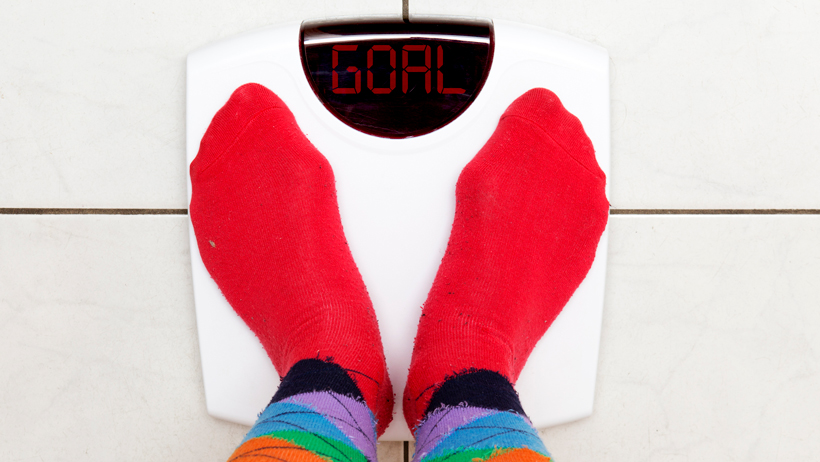The "struggle is real" could apply to lots of things, but it has practically become synonymous with weight loss. Mix in four-plus decades of life and that struggle becomes harder: loss of muscle mass, decrease in bone density, and a slower metabolism -- to name a few reasons. This is all the more incentive to start exercising when you are younger.
Truthfully, losing weight is hard for anyone, and I blame homeostasis.
Homeostasis is the body maintaining stability, for example body temperature. No matter what the temperature is outside, your body maintains a temperature around 98.6 degrees (most of the time). Your body does the same thing with your weight (aside from pregnancy and puberty). Even when we eat less or skip a meal because we are sick, our body makes up for it by eating a little more food than usual the next day.
Fighting this uphill battle requires change. The first thing to do is talk to your doctor and make sure there's not a medical reason for your weight gain like a thyroid issue.
After that, look at your diet and lifestyle. Here are some habits that make weight loss a struggle and how you can take a first step in countering each one.
1. Eating too much
This is obvious, but it's easy to overeat. Make sure you are not finishing your friends' meals or your kids' scraps to start, or eating so fast you haven't given your body enough time to tell you it's full.
2. Not eating enough
Yes, this happens and matters. Many dieters will try under-eating thinking starvation leads to weight loss. Eventually your body catches on and will lower its metabolism thinking food is scarce.
3. Too much sugar/empty carbs
Like eating one potato chip, it's hard to eat one piece of candy/chocolate. Sugar and salt are trigger foods that make it easy to overeat. Treats are not high in nutritional value (vitamins and minerals), so pay attention to portion size and frequency of these types of food.
4. Not enough vegetables
I've never heard of a client getting fat eating too much steamed broccoli; however I've had numerous clients tell me they do not eat veggies. Veggies, unless you have a gastro-intestinal issue, are the best items you can eat, especially if they are grilled, baked, boiled or steamed. Eat veggies as snacks and as part of every meal.
5. Too many meals out
Traveling for work or fun is hard on your diet. Restaurants use way more oil, salt, and sugar to make food taste great. This amounts to lots of calories. If you can cook at home, you save yourself calories and money. If you have to eat out, look for healthier restaurants. If you know the portions are huge (e.g. Cheesecake Factory), split the meal or ask them to only bring out half.
6. Lack of sleep
If you don't sleep enough it affects every aspect of your life, even weight. Lack of sleep can cause you to be too tired to exercise or make poor eating decisions. If you don't sleep well, consult your doctor.
7. Increased stress
Stress is inevitable; it's how you deal with it that matters. Instead of stress-eating, try exercise or meditation. There are a ton of apps that help you meditate for as little as 10 minutes a day.
8. Not enough water
We all know drinking water throughout the day is important but many people skip it. This is especially important if you are exercising or out in the heat. Keep a water bottle with you at all times; it can help with fatigue, headaches, weight loss and much more.
9. Excess sitting/couch time
I often hear, "I'm too tired to get off the couch at night." If you want more energy, move more. Work your way to limiting your television time to 30 minutes most nights and you will be more productive and probably thinner.
Fighting an uphill battle can be hard, and it makes attempting a crazy diet or radical change tempting. Going on a cleanse or workout binge might result in you dropping a lot of weight in a short period of time; the flip side is you eventually return to old habits and the weight comes back on. Part of the problem is homeostasis pulling you back to where your body thinks it belongs; the other issue is your lifestyle was probably not the healthiest.
The key to keeping off the weight is consistency. You have to slowly get your body used to a thinner you. Make gradual changes that you can follow for life. Instead of thinking about what you cannot eat, focus on what you can eat, like whichever fruits and vegetables you love most.
You might be wondering why I haven't touched on exercise. I'm a trainer, what's a matter with me? Where's the emphasis on high-intensity exercise? Of course I'm all for exercise, but if you have not exercised in a while (first talk to your doctor), start off slow. Concentrate on learning proper form, and ramp up the intensity as movements become easier.
Slow and steady might not help you win The Biggest Loser, but it will help you in the long term.
P.S. Google "The Biggest Loser Aftermath," it's not pretty.


.jpg?n=1760)

.jpg)
.jpg)




.jpg)



